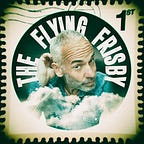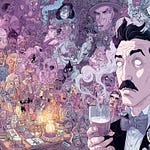At a drinks party in around 2011 or 2012, I had the ear of Andrew Feldman, aka Baron Feldman of Elstree, former Chairman of the Conservative Party—he of “swivel-eyed loons” fame, though he never actually said that. (Andrew is a friend, by the way.)
“Tell George Osborne to buy back the gold Gordon Brown sold,” I advised.
“At these prices?” smiled Andrew with a mix of incredulity, amusement, and polite condescension.
“Yes!” I said. “It might be good publicity, even. Or do it secretly, and announce it afterward. The important thing is getting the gold back. We will need it at some point. Why not just quantitatively ease the money and buy it back? You’re doing that and buying bonds.”
Andrew laughed at my joke, which wasn’t a joke, and then wandered off in search of someone more sane to talk to.
Given the government has this extraordinary power to create money out of nothing, why don’t they just print money and buy hard assets with it?
Park that thought for a moment.
A couple of months ago, I was at Liz Truss’s book launch—aren’t you impressed with all this name-dropping?—and I ran into Mark Littlewood, former director of the IEA and now of PopCon. I started bending his ear about the media’s failure to report on the Bank of England and how it had shafted Truss with its advanced notice of gilt sales, Quantitative Tightening, which began the day before Kwasi Kwarteng’s budget and led to a collapse in the gilt market, the blame for which was then left at Kwasi Kwarteng’s doorstep. Mark nodded. “Do you think I don’t know?” said Liz.
“I would love to be able to grill Andrew Bailey in public,” I said. “Or just ask him one question with people watching. I know exactly what I’d ask him.”
“What?” said Mark.
“If the Bank of England can print money, why do we need taxes?”
Mark laughed and, thinking I was asking him that question, replied, “Money illusion.”
Money illusion is one of those economic terms that is pretty self-explanatory, but here is an example. Most of know a hundred pounds does not buy you today what it bought you ten years ago, but we still think in terms of past prices. (Old people do this more, for obvious reasons). A worker might feel great with a 5% raise, but if inflation is 7%, he is actually earning less than before. This has been an ongoing process for decades with the result that, in real terms, wages are lower.
Here’s the Wikipedia definition (edited by me):
In economics, money illusion, or price illusion, is a cognitive bias where money is thought of in nominal, rather than real, terms. In other words, the face value (nominal value) of money is mistaken for its purchasing power (real value) at a previous point in time. The term was coined by Irving Fisher in Stabilizing the Dollar, and popularized by John Maynard Keynes in the early twentieth century. Fisher also wrote a book on the subject, The Money Illusion, in 1928.
Mark and I both doubted that Bailey would give that as the answer, even if he thought it, which we doubted he would. If governments started printing money and buying assets, many would start questioning money, and faith in fiat might quickly evaporate. If governments worldwide started doing it (eg Britain prints money and starts buying land in France) you are in race-to-the-bottom territory. It would be a race to the bottom for fiat currency.
Even if Bailey thought money illusion was the answer, he certainly wouldn’t say it because that in itself undermines fiat.
Modern money has nominal value, but not intrinsic value. It relies on illusion (and the law) to function. The more you debase it, the less likely that illusion is to hold. Maybe money delusion is more accurate. Obviously, the backing of the law makes a great difference, as does the fact that taxes must be collected in this money, but, boy, is the system vulnerable. Illusions can last a long time. But when they shatter, they shatter very quickly, and then there is nothing.
I don’t say the system will pop. It has been going on for a long time. But I do observe that it very easily could.
It’s why I recommend both gold and bitcoin. Both are money in and of themselves: one is the product of nature, the other the product of extraordinary amounts of computer power. Neither relies on anyone else.
If you are interested in buying gold, check out my recent report. I have a feeling it is going to come in very handy.
Life After the State - Why We Don’t Need Government (2013), my first book, is now back in print - with the audiobook here: Audible UK, Audible US, Apple Books. I recommend the audiobook ;)
And if you are in the Scottish neck of the woods this August, look out for me at the Edinburgh Fringe. I’ll be performing one of my “lectures with funny bits”. This one is all about the history of mining. As always, I shall be delivering it at Panmure House, where Adam Smith wrote Wealth of Nations. It’s at 2pm most afternoons. You can get tickets here.













